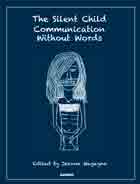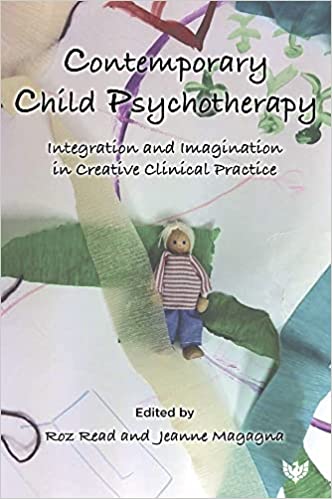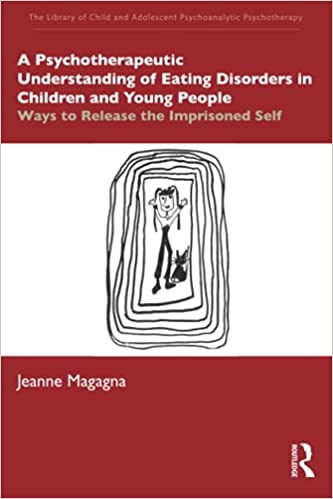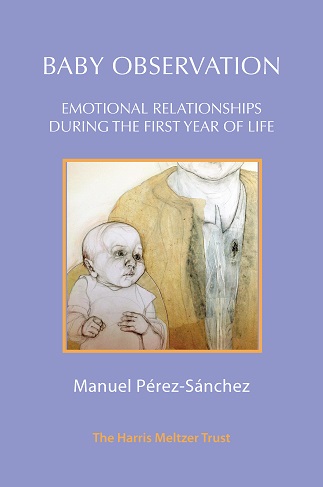Being Present for Your Nursery Age Child: Observing, Understanding, and Helping Children
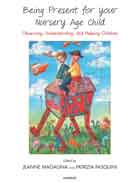
Book Details
- Publisher : Routledge
- Published : July 2014
- Cover : Paperback
- Pages : 336
- Category :
Child and Adolescent Studies - Catalogue No : 35295
- ISBN 13 : 9781782201410
- ISBN 10 : 1782201416
Our Customers Average Rating
Read all reviews (1)





This book represents an innovative project in which parents, teachers and other professionals work collaboratively to observe children, understand them at a deep emotional level through their play and interaction with others, and facilitate their relationships with themselves as individuals and with others. The work described has been particularly important in nurturing children’s creativity and fostering effective relationships between teachers, parents and children. The innovative nursery described has been an important preventative facility in promoting the wellbeing of young children. The Italian government has supported this highly esteemed project.
Reviews and Endorsements
'This book will be of enormous interest to those parents, grandparents, and professionals who seek to understand more of the minds of babies and small children and how they experience life and relationships. It attests to the significance of a particular kind of observation, of taking notice of children and their experiences in a setting created by Patrizia Pasquini, supported by Jeanne Magagna, from London. Pasquini has created an inspired project, Tempo Lineare, where professionals and parents work together in the best interests of the child. Pasquini has based it on an understanding of a particular, non-intrusive way of observing children, which, in group discussion, enables parents and professional staff together to discuss their thoughts and ideas. This book provides a source of inspiration for parents, and for anyone who works with small children, seeking to understand more about creative work with parents and colleagues in the best interests of the children.’
— Trudy Klauber, Consultant Child Psychotherapist, Tavistock Clinic
‘This book beautifully captures the remarkable achievements as well as the atmosphere of Tempo Lineare, the innovative preventive mental health programme developed for babies and young children in nursery and their parents in Rome. Like the collaborative programme itself, the book gathers together contributions from child psychotherapists, teachers, and parents. Each chapter vividly brings alive the thoughtful and creative approaches put in place to foster and support parents’ capacities to be present to their child’s and their own emotional experiences. Underscoring the Tavistock method of psychoanalytic observation at the heart of each level of the programme, Jeanne Magagna and Patrizia Pasquini lucidly lay out its applications in all that takes place there. The book weaves psychoanalytic theory, observational data, and personal reflections into a cohesive whole. It also puts the reader in touch with the deeply meaningful world of play, drawing, and story-telling and their essential place in the development of imaginative capacities. On every page, this book inspires and enriches our understanding. It is essential reading for a broad spectrum of disciplines interested in very young children’s social, cognitive, and emotional development.’
— Deborah Blessing, board member, Jubilee Jumpstart Child Care Center; Core Faculty, Infant and Young Child Observation Program, Washington School of Psychiatry, USA
The contributions in this book are just a sample of the work done by both parents and practitioners involved in the Tempo Lineare programme, including direct testimonies from parents relating what they have gone through since the birth of their babies. It is rare to read something of this sort written directly by the protagonists, without the filter of an expert, and they illuminate the difficulties, problems, and dramas of ecoming a parent. From the stories of these mothers and fathers, the importance of having a place - both mental and physical - to share not only one’s fears and anguish, but also one's joy and successes with other people in the same situation, emerges clearly. It helps parents to realise that what they are experiencing, although painful and frustrating, is not unique; that others are dealing with similar difficulties, and this gives a powerful incentive in trying to overcome what appears to be a huge problem. With original richness and depth, this book shows exactly what Tempo Lineare tries to do.’
— Giusseppe Parigi, President of the Tempo Lineare Parents’ Association
About the Editor(s)
Jeanne Magagna was Head of Psychotherapy Services at Great Ormond Street Hospital for Children for twenty-two years. She also worked for ten years at Ellern Mede Centre for Eating Disorders in London. She received professional qualifications as a child, adult and family psychotherapist and a doctorate from the Tavistock Clinic. Formerly, Jeanne was the vice-president and joint coordinator of training for the Centro Studi Martha Harris Tavistock model trainings in Florence and Venice. She edited Universals of Psychoanalysis and jointly edited Psychotherapy with Families and Intimate Transformations: Babies with their Families (Karnac Books, 2004). Her special interest is applying the understandings of infant observation to work with children suffering from communication difficulties and anorexia nervosa.
Patrizia Pasquini completed a master’s degree in Observation and Application of Psychoanalytical Concepts to the Work with Children, Adolescents and Families at the Centro Studi Martha Harris in Rome and the Tavistock and University of East London Degree Programme (1992-1994). She became a member of the Tavistock Society of Psychotherapists following completion of the Centro Studi Martha Harris Florence Tavistock Model Psychotherapy Child and Adolescent Psychotherapy Training. As part of her psychoanalytic training Patrizia also participated in a Psychoanalytic Group Psychotherapy Training at Spazio Psicoanalitico in Rome under the directorship of Professor Paolo Perrotti. Later she attended a three year group training on 'The Psychoanalytic Meaning of Tales'. Later Patrizia conducted a two year experiential group focussing upon emotional processes in teaching practice at the Spazio Psicoanalitico. Using the drawings of the Tempo Lineare children she later published a book of fairy tales, Da Fiaba Nasce (2002). Patrizia is currently the creator and Director of the Tempo Lineare Service in Rome which is described in this book.
Customer Reviews
Our customers have given this title an average rating of 5 out of 5 from 1 review(s), add your own review for this title.
Deirdre Wilkins on 05/06/2014 16:03:46




 (5 out of 5)
(5 out of 5)
This book vividly describes and discusses the Tempo Lineare Project: a therapeutic approach to nursery school education: a school for life. The book will be of interest to teachers, psychotherapists and parents of nursery school aged children. The importance of the dynamic, triangular relationship between parent, child and teacher is highlighted. Threads of psychoanalytic thought are woven throughout the book, enabling parents to better understand their children.
The Tempo Lineare Nursery is set in the 1st Municipality in centre of Rome and promoted by the City of Rome local government to become part of the Rome Education Services. It was first opened by Patrizia Pasquini in 1999 for children from zero to three years and their parents. The school was so appreciated by the families that it was expanded to include children aged from four to six years and their parents. Children are accepted from families in the Municipality from all cultures and walks of life, including children with medical, physical disabilities, psychological or neurological problems.
Half of the children admitted were adopted.
Interestingly, Tempo Lineare is situated near the original Casa dei Bambini, the first nursery school in Rome, Maria Montessori’s Children’s House. Montessori emphasised the intellectual/academic and cognitive development of the child using her specially designed didactic apparatus. However, she did believe in “following the child” and also encouraged spontaneous play and work within a prepared environment. The first children in Montessori’s school were admitted from the slum streets in the centre of Rome. In the Tempo Lineare Nursery, it is the emotional and creative development of the child which is emphasised, within a warm , colourful and attractively prepared environment.
The ideas in this book are based on the psychoanalytic observational studies according to the Tavistock Clinic method of Infant and Young Child Observation. The observational contributions in this book are rich in detail and bring individual children and group relationships in the Nursery School to life for the reader. They include vignette observations by the Head of the School Patrizia Pasquini and psychotherapists Carlo Busato Barbaglio, Head of the Italian Institute of Psychoanalysis Child Training, and Jeanne Magagna, child, adult and family psychotherapist who teaches Child Psychotherapy in Florence and Venice Italy. Both mothers and fathers are taught to use participant observation and are encouraged to observe their own child at home and at school.
Special emphasis is placed on the spontaneous, imaginative, creative play of the individual child and on the development of the emotional relationship between the child and mother and/or father, teacher and psychotherapist. The parents have the crucial task of helping the child develop an internal space for holding emotions, phantasies and dreams and allowing thoughts and other emotions to arise in relation to them. This is particularly achieved by the both father and mother spending time in the school, playing with their child and becoming aware of their own inner child. The child is seen to develop a capacity to learn, to lead, to follow instructions, and make compromises. Above all, the child is encouraged to develop his inner strength, self-esteem, to be creative, sociable, curious, to consider others and to think and express himself clearly.
This book opens doors into this “school for life” and gives a sensitive and vivid picture of this containing environment. It is a rich and useful resource in actively supporting parents, grandparents and their children. The final chapter “Parents Speaking” includes fourteen moving, personal accounts of their time at Tempo Lineare and what this has meant to them and their families. This book is also essential reading for any professional interested in preventative work created in collaboration with parents of children of nursery school age.
Reviewed by Deirdre Wilkins, retired Teacher and Principal of two Montessori schools; Early Years Consultant and Nursery Inspector, M.A in Education and Psychoanalysis and an additional M.A in Art History. Deirdre has also completed the Observational Studies Course at the Tavistock Clinic.
You may also like
New Discoveries in Child Psychotherapy: Findings from Qualitative Research
Margaret Rustin
Price £36.47
save £1.52
The Truth about Trauma and Dissociation: Everything You Didn't Want to Know and...
Valerie Sinason
Price £17.09
save £1.90
Baby Observation: Emotional Relationships during the First Year of Life
Manuel Perez-Sanchez
Price £25.19
save £2.80


